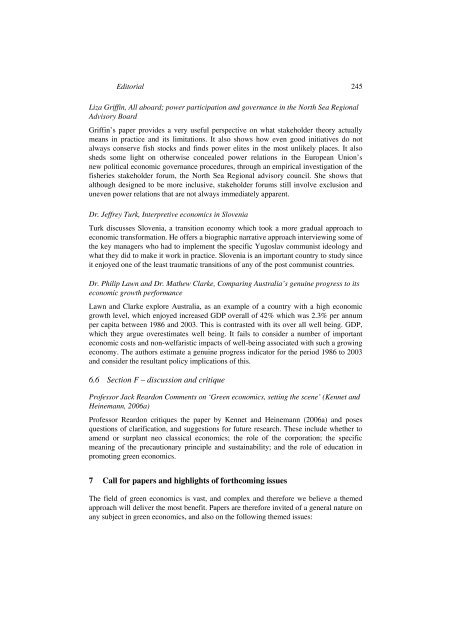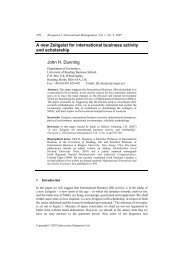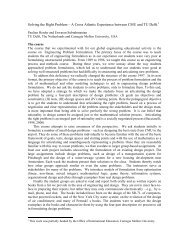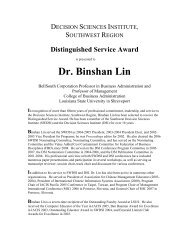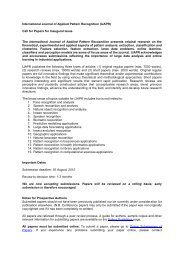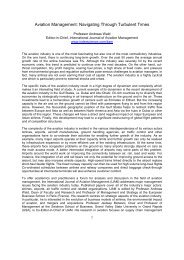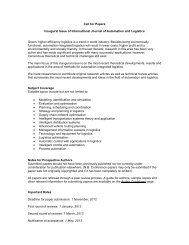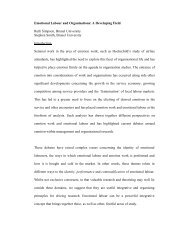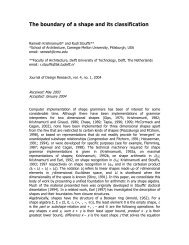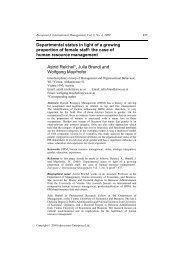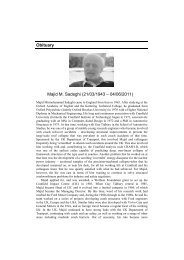Editorial: progress in Green Economics: ontology, concepts and ...
Editorial: progress in Green Economics: ontology, concepts and ...
Editorial: progress in Green Economics: ontology, concepts and ...
Create successful ePaper yourself
Turn your PDF publications into a flip-book with our unique Google optimized e-Paper software.
<strong>Editorial</strong> 245<br />
Liza Griff<strong>in</strong>, All aboard; power participation <strong>and</strong> governance <strong>in</strong> the North Sea Regional<br />
Advisory Board<br />
Griff<strong>in</strong>’s paper provides a very useful perspective on what stakeholder theory actually<br />
means <strong>in</strong> practice <strong>and</strong> its limitations. It also shows how even good <strong>in</strong>itiatives do not<br />
always conserve fish stocks <strong>and</strong> f<strong>in</strong>ds power elites <strong>in</strong> the most unlikely places. It also<br />
sheds some light on otherwise concealed power relations <strong>in</strong> the European Union’s<br />
new political economic governance procedures, through an empirical <strong>in</strong>vestigation of the<br />
fisheries stakeholder forum, the North Sea Regional advisory council. She shows that<br />
although designed to be more <strong>in</strong>clusive, stakeholder forums still <strong>in</strong>volve exclusion <strong>and</strong><br />
uneven power relations that are not always immediately apparent.<br />
Dr. Jeffrey Turk, Interpretive economics <strong>in</strong> Slovenia<br />
Turk discusses Slovenia, a transition economy which took a more gradual approach to<br />
economic transformation. He offers a biographic narrative approach <strong>in</strong>terview<strong>in</strong>g some of<br />
the key managers who had to implement the specific Yugoslav communist ideology <strong>and</strong><br />
what they did to make it work <strong>in</strong> practice. Slovenia is an important country to study s<strong>in</strong>ce<br />
it enjoyed one of the least traumatic transitions of any of the post communist countries.<br />
Dr. Philip Lawn <strong>and</strong> Dr. Mathew Clarke, Compar<strong>in</strong>g Australia’s genu<strong>in</strong>e <strong>progress</strong> to its<br />
economic growth performance<br />
Lawn <strong>and</strong> Clarke explore Australia, as an example of a country with a high economic<br />
growth level, which enjoyed <strong>in</strong>creased GDP overall of 42% which was 2.3% per annum<br />
per capita between 1986 <strong>and</strong> 2003. This is contrasted with its over all well be<strong>in</strong>g. GDP,<br />
which they argue overestimates well be<strong>in</strong>g. It fails to consider a number of important<br />
economic costs <strong>and</strong> non-welfaristic impacts of well-be<strong>in</strong>g associated with such a grow<strong>in</strong>g<br />
economy. The authors estimate a genu<strong>in</strong>e <strong>progress</strong> <strong>in</strong>dicator for the period 1986 to 2003<br />
<strong>and</strong> consider the resultant policy implications of this.<br />
6.6 Section F – discussion <strong>and</strong> critique<br />
Professor Jack Reardon Comments on ‘<strong>Green</strong> economics, sett<strong>in</strong>g the scene’ (Kennet <strong>and</strong><br />
He<strong>in</strong>emann, 2006a)<br />
Professor Reardon critiques the paper by Kennet <strong>and</strong> He<strong>in</strong>emann (2006a) <strong>and</strong> poses<br />
questions of clarification, <strong>and</strong> suggestions for future research. These <strong>in</strong>clude whether to<br />
amend or surplant neo classical economics; the role of the corporation; the specific<br />
mean<strong>in</strong>g of the precautionary pr<strong>in</strong>ciple <strong>and</strong> susta<strong>in</strong>ability; <strong>and</strong> the role of education <strong>in</strong><br />
promot<strong>in</strong>g green economics.<br />
7 Call for papers <strong>and</strong> highlights of forthcom<strong>in</strong>g issues<br />
The field of green economics is vast, <strong>and</strong> complex <strong>and</strong> therefore we believe a themed<br />
approach will deliver the most benefit. Papers are therefore <strong>in</strong>vited of a general nature on<br />
any subject <strong>in</strong> green economics, <strong>and</strong> also on the follow<strong>in</strong>g themed issues:


